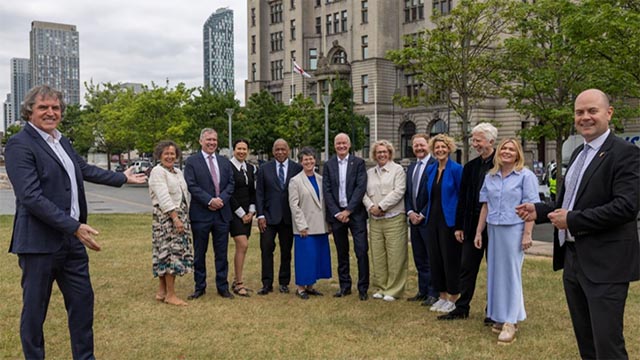The developer’s view: Colette O’Shea
The system for all of us is hugely complicated and we have got layers and layers of bureaucracy that we have to try to work through.
It is difficult for developers and it is also very difficult for local authorities, on top of which there is a real shortage of resources to deal with all the complexities we are facing.
Within local authorities there is an appetite to try to address the issues and make things happen and move London forward, but they are heavily constrained. It has always taken a long time to get through planning. It is taking us even longer at the moment.
While the policies in themselves are relatively flexible, I don’t think we are being allowed to use them in a way that delivers the best results. We have got conflicts all the time between what we are trying to do about affordable housing, what we are trying to do about public realms, what we are trying to do about education. And there doesn’t seem to be much in terms of hierarchy and importance.
We, the developers, are very creative. I think local authorities are not being particularly creative. We need to be much more realistic about how we can deliver our affordable housing requirements. Just handing over cheques that sit in banks isn’t going to move London forward.
The planner’s view: Peter Rees
The other thing the government has done is to dumb down planning. Even as we speak the government is tearing up the planning system. I often feel ashamed that we have a weaker planning system than many African countries. We have got to the point where you can’t even zone land. How on earth can you plan a place if you can’t decide which land use goes where?
If the market is capable of planning, I have yet to see any evidence of it. All we will get without planning is a feeding frenzy which will cause huge problems in areas that haven’t been able to retain control – for instance, in the change of use from office to resi.
I am concerned that we are coming to the end of the planning system. It is a desperate position. How many authorities have a chief planner who reports to the chief executive? We don’t any longer.
I wouldn’t recommend anybody to join the profession. It’s dead at the moment.
Rosemary MacQueen
I see planning going down the agenda. It used to be the most important thing at Westminster, and that is no longer the case.
At the same time, localism is sitting there festering. There is an elephant in the room. If you think that you get difficulties with planners, wait until you have to go before a residents’ panel.
The business view
Faraz Babar There is a broader point about local authorities understanding the cumulative planning obligation requirement that is being put on developers. What we are finding is that CIL charges being drafted at the moment don’t necessarily take into account all the planning obligations that are required on top of CIL.
There are boroughs that haven’t got their heads around what their requirements are in terms of understanding and asking the right questions of the consultants they employ to get underneath what is important in terms of viability.
The optimist: Mike Hussey
In London we are actually not in as bad a place as people think. Having professional people on both sides and in terms of the types of scheme and the value of the schemes, by definition you have got fairly sophisticated property companies and developers.
And on the other side we are blessed by the fact that we have sophisticated, long-term planning experts with whom you can have a proper dialogue.
The companies here have all brought very exciting architects to London over the past decade. The reason for the success of these projects – and boroughs can claim credit for this – is because you get continuity of feedback from people who understand the fabric of the borough.
So if you are looking for positives, there is sufficient flex in the system for good professionals on both sides to make progress on planning in London. What we are trying to do is identify what makes it better, quicker, more efficient, less of a waste of time.
You can blow millions on professional fees getting to a point of securing planning, and it is only because you are addressing a very inefficient process.
To make it better, either you have to go back to the strategic level and create a structure that is preordained, pre-signed off so that the officers can then interpret it and just deliver it from there, or you really do have to invest very heavily.
The cavalry? Stewart Murray
The message from city hall to those boroughs that are up for the growth agenda is that we will come piling in with resource, infrastructure investment, economic support and technical planning and viability support. We are doing a lot with Croydon. I am meeting Harrow. They are keen to turn themselves around. We are going in and looking at what they want to do. In central London we can’t just assume you are always going to be able to do it on your own. You need support now again, or at least collaborative support.
Issues raised at this roundtable will be discussed further at October’s London Property Summit, where the theme will be Unlocking London’s capital value. Click here for more information ?and to book.











